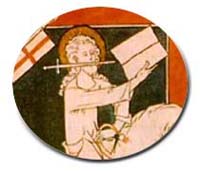 |
Forgotten Truths
By Departing from Traditional Worship,
a Pope Falls into Schism
With Traditionis custodes, Pope Francis intended to ban the Perpetual Mass of the Church, codified by St. Pius V in the 16th century according to the canons of the Council of Trent. This Mass, however, was created neither by that Pontiff nor that Council. They merely codified the same Mass that had been said since the time of the Apostles. This Mass, consequently, has been identified with the Catholic Church for her entire History. It is her Perpetual Mass.
In 1969, Pope Paul VI created a New Mass, which he de facto enforced on the Church, while he theoretically admitted a right for the Perpetual Mass to be said. Now, Pope Francis
abolished de jure the Perpetual Mass of the Church.
This new decision raises the question of whether a Pope has the right to abolish the multi-secular Mass of the Catholic Church. Great theologians of the past discussed this possibility and concluded that a Pope who separates himself from the traditional ecclesiastical cult of the Church becomes schismatic, although without ipso facto losing the office of the Papacy.
Today, TIA begins to post the opinions of some of these theologians to help our readers better understand the complex situation in which we live.
Card. John of Torquemada (1388-1468)
To demonstrate that a Pope can separate himself illegitimately from the unity of the Church and from obedience to the Head of the Church and, therefore, fall into schism, Cardinal Torquemada uses three arguments:
“1. (…) by disobedience, the Pope can separate himself from Christ, who is the principal Head of the Church and in relation to Whom the unity of the Church is primarily constituted. He can do this by disobeying the law of Christ (1) or by ordering something which is contrary to natural or divine law. In this way he would separate himself from the body of the Church, while it is subject to Christ by obedience. Thus, the Pope would be able without doubt to fall into schism.
2. The Pope can separate himself without any reasonable cause, just by pure self will, from the body of the Church and the college of priests. He will do this if he does not observe that which the Church Universal observes on the basis of the Tradition of the Apostles according to the chapter Ecclesiasticarum, dil. 11, or if he did not observe that which was universally ordained by the universal Councils or by the authority of the Apostolic See, above all in relation to Divine Worship: For example, not wishing to observe personally something from the universal customs of the Church, or the universal rite of the ecclesiastical cult.
This would take place should he not wish to celebrate with the sacred vestments, or in consecrated places, or with candles, or should he not wish to make “The Sign of the Cross” like the other priests make it, or other similar things which have been decreed in a general way for perpetual useage, according to the canons Quae ad perpetuam, Violatores, Sunt quidam and Contra statuta (25, q. 1).
Departing in such a way, and with pertinacity, from the universal observance of the Church, the Pope would be able to fall into schism. The consequence is good; and the antecedent is not doubtful, for the Pope, just as he could fall into heresy, could also disobey and pertinaciously cease to observe that which was established as the common order in the Church. For this reason, Innocent says (c. De Consue.), that one ought to obey the Pope in everything as long as he does not turn against the universal order of the Church, for in such a case the Pope must not be followed, unless there be reasonable cause for this.
3. Let us suppose that more than one person considers himself Pope, and that one of them is the true Pope, but is considered by some to be seemingly dubious. And let us suppose that this true Pope comported himself with such negligence and obstinacy in the pursuit of unity in the Church that he did not wish to do everything he could for the reestablishment of unity. In this hypothesis, the Pope would be considered as a fomenter of schism, according to what many have argued, even in our days, regarding Benedict XIII and Gregory XII” (2)

(Arnaldo V.X. Silveira, The Theological Hypothesis of a Heretic Pope,
available
here, p. 181)
Posted on August 14, 2021



Related Topics of Interest
 How a Catholic Should Act Before Bad Popes How a Catholic Should Act Before Bad Popes
 When Does a Heretical Pope Become an Invalid Pope? When Does a Heretical Pope Become an Invalid Pope?
 Can a Pope Err in Doctrinal, Liturgical & Canonical Matters? Can a Pope Err in Doctrinal, Liturgical & Canonical Matters?
 The New Mass - A Flavor of Protestantism The New Mass - A Flavor of Protestantism
 Quo Primum vs. Novus Ordo Quo Primum vs. Novus Ordo
 Declaration of Resistance to the Vatican
Ostpolitik Declaration of Resistance to the Vatican
Ostpolitik
 Resisting the Novelties of the Conciliar Church Resisting the Novelties of the Conciliar Church
 The Novus Ordo Mass Broke the Identity of the Church The Novus Ordo Mass Broke the Identity of the Church

Related Works of Interest
|
Forgotten Truths | Religious | Home | Books | CDs | Search | Contact Us | Donate

© 2002-
Tradition in Action, Inc. All Rights Reserved
|
 |
|